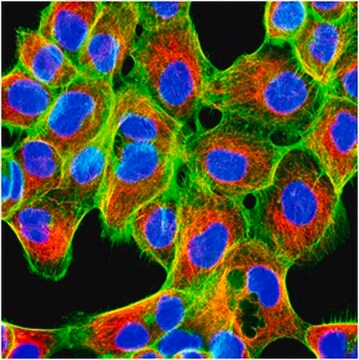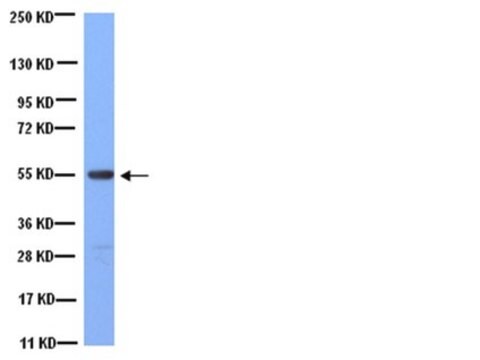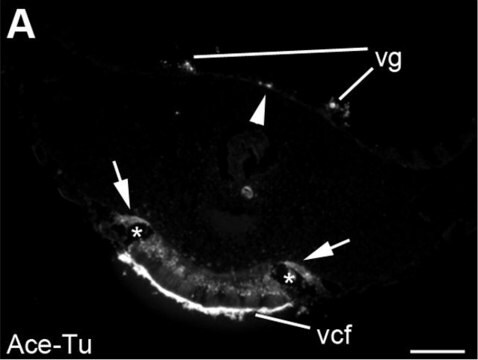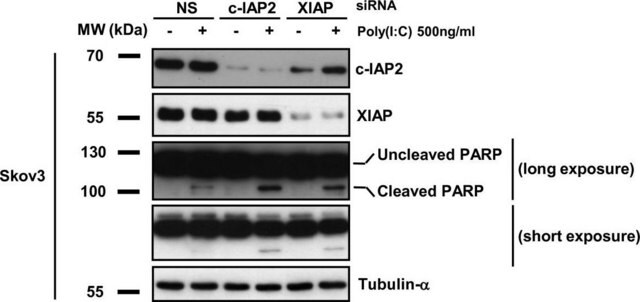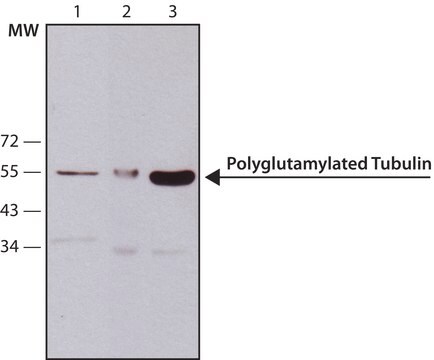Wichtige Dokumente
SAB4200776
Anti-TUBA1A (TUBA3) Antibody
mouse monoclonal, TUB-1A2
Synonym(e):
Tubulin Alpha-1 Chain
About This Item
Empfohlene Produkte
Produktbezeichnung
Anti-Tubulin, Tyrosine antibody, Mouse monoclonal, clone TUB-1A2, purified from hybridoma cell culture
Biologische Quelle
mouse
Qualitätsniveau
Antikörperform
purified from hybridoma cell culture
Antikörper-Produkttyp
primary antibodies
Klon
TUB-1A2, monoclonal
Form
buffered aqueous solution
Mol-Gew.
~55 kDa
Speziesreaktivität
Xenopus, Arabidopsis sp., yeast, insect, rat, hamster, porcine, monkey, bovine, human, mouse, canine, chicken
Konzentration
~1 mg/mL
Methode(n)
immunoblotting: suitable
immunofluorescence: 2-4 μg/mL using human HeLa or Chicken fibroblast cells
immunohistochemistry: suitable
Isotyp
IgG3
UniProt-Hinterlegungsnummer
Versandbedingung
dry ice
Lagertemp.
−20°C
Posttranslationale Modifikation Target
unmodified
Angaben zum Gen
human ... TUBA1A(7846)
Allgemeine Beschreibung
Spezifität
Immunogen
Anwendung
- immunoblotting
- immunofluorescence
- immunohistochemistry
Biochem./physiol. Wirkung
Physikalische Form
Lagerung und Haltbarkeit
Haftungsausschluss
Sie haben nicht das passende Produkt gefunden?
Probieren Sie unser Produkt-Auswahlhilfe. aus.
Lagerklassenschlüssel
12 - Non Combustible Liquids
WGK
WGK 1
Flammpunkt (°F)
Not applicable
Flammpunkt (°C)
Not applicable
Hier finden Sie alle aktuellen Versionen:
Analysenzertifikate (COA)
Die passende Version wird nicht angezeigt?
Wenn Sie eine bestimmte Version benötigen, können Sie anhand der Lot- oder Chargennummer nach einem spezifischen Zertifikat suchen.
Besitzen Sie dieses Produkt bereits?
In der Dokumentenbibliothek finden Sie die Dokumentation zu den Produkten, die Sie kürzlich erworben haben.
Global Trade Item Number
| SKU | GTIN |
|---|---|
| SAB4200776-100UL | 4061833265314 |
Unser Team von Wissenschaftlern verfügt über Erfahrung in allen Forschungsbereichen einschließlich Life Science, Materialwissenschaften, chemischer Synthese, Chromatographie, Analytik und vielen mehr..
Setzen Sie sich mit dem technischen Dienst in Verbindung.